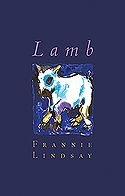 Frannie's first book, Where She Always Was, won the May Swenson Award; her second book, Lamb, is forthcoming as Perugia Press’s 2006 Intro Award winner. I'm a big fan of the cover, pictured here.
Frannie's first book, Where She Always Was, won the May Swenson Award; her second book, Lamb, is forthcoming as Perugia Press’s 2006 Intro Award winner. I'm a big fan of the cover, pictured here.I've been thinking a lot about first books lately, when and how to take the plunge: it's an overlooked fact that the odds of someone's manuscript being ready for publication, and the readiness of that poet to be the author of his/her first book, are extremely unlikely to happen at the same time. I've been following Kate Greenstreet's terrific series of interviews with poets on how their first book did (or did not) change their lives.
One recurring theme in the Q&As is that the poets who made the happiest transition beyond initial publication were those who were already actively invested in another phase of writing when the first book finally made it into print. Which makes sense...except, in practice, until that earlier collection receives the outside validation, I suspect we continually ask ourselves: is this my real first book? Is this my new, better self? Shouldn't these shiny new poems squeeze out those dusty old ones? If I just shuffle and reshuffle and pay my $20 fees and hold out another 8 months, will Louise Gluck recognize my singular genius?
Just keep writing, I know. A friend was warning me, just the other day, to not throw the baby out with the bathwater just because I was excited with some new work. Then she admitted that she, too, was thinking about reincarnating her first book manuscript--allowing only a few core poems to survive from the previous version. Shut up. Keep writing. I know. I know.
9 comments:
Hey Sandra! I met you at AWP in Chicago after you took one of my poems for Folio. Nice to see you in the blogosphere!
Thanks for your note on my blog. It does seem to be a familiar story for a lot of us.
I supposed I'm in the same boat of "just keep writing." I'm going to keep at it until I die, probably. And I have lots of stuff written, probably enough for a few books. I just hope someone picks it up, then I'll go on to the next one.
Though I'm nowhere near having a first book published, my take on it is that you can't give up on a large chunk of good work that's not winning contests--it's good work, and there's a very, very good chance that even replaced with "more excellent" work, it wouldn't win the same contest because (A) individual judge tastes vary so widely, (B) committee decisions on finalists often suck, and (C) there's enough good work that even if everything else aligns it still may end up being a crapshoot.
Personally, I think my "manuscript" as it stands is screwed because I'm writing so differently now than I did last year or the year before that the good work from those times doesn't mesh very well. And even I can't say I'm too unlucky, since a bunch of it is published in good places and I know I'm not in the first round auto-rejections of the average contest. Wheeeee!
It's a good question, no doubt. One thing about my first book for which I'm grateful is that the final product is, maybe, 30% changed from what Campbell McGrath chose. Some of what I feel to be the best poems were written after it was accepted and I was making revisions on literally the last day I could, before it went to press. However, there did come a point where I stopped adding new poems to Resurrection, when I started actively working on what would will be Notes. It made me kind of crazy because getting the first book was obscenely easy; the second, not so much. I had become fairly discouraged. So much so that I had no idea I had the makings of a third manuscript until the Notes was accepted and all that fell away. Anyway.
Thanks, by the way, for the congratulations. I appreciate it.
I like that I've dedicated myself to an art where we comfort ourselves with the "crapshoot" theory of success. Don, Steve, Matthew, I feel your pain (or in Steve's case, I echo your masochistic "Wheeee!").
Ah, flashbacks to Folio days, when I read excellent poems by both Matthew and Mr. Jensen. Charles's Yoko Ono poem was one of my favorites, and I chose it to lead off an issue. When I saw him at AWP, all I could think was "He's so talented! And so frickin' tall!"
Paul, that's a LOT to have changed from the original MS...rivals my friend Kyle Dargan, who submitted virtually an entire new book, from title to TOC, when he won the Cave Canem Prize. Luckily Quincy Troupe just went with it.
Thanks for visiting my blog, folks. = )
Sandra, I went back and looked: there were 10 poems I cut from the submitted manuscript (it was long: 80 pages; in contrast, Notes and my new mauscript are both 58 pages) and 3 or 4 I added, bringing it in at 64 pages, still longer than the next two.
You make great points here. "Just keep writing"-- Good advice. Thanks for the post.
Hi Sam--
Nice to see you here, Sam! Glad my kvetching is of use to someone. = )
Paul, it's comforting to think in terms taking a few poems out, putting a few in as part of the finishing process. Here's to hoping that there are judges out there who can and do choose the manuscript that has more potential, but requires some tweaks, over the manuscript that is ready-for-press but a bit more bland.
Post a Comment